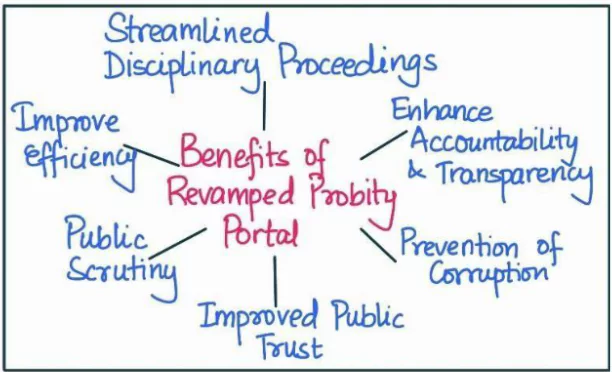Answer:
|
How to approach the question
- Introduction
- Write about India’s revamped probity portal for government employees briefly.
- Body
- Write the potential benefits of India’s revamped probity portal.
- Write the limitations associated with India’s revamped probity portal.
- Conclusion
- Give appropriate conclusion in this regard.
|
Introduction:
DoP&T has recently completely revamped the existing Probity Portal for government employees. It will demand the right attitude towards public service with ‘integrity’ and ‘probity’ serving as a bastion of trust, promoting a culture of honesty and ensuring the highest standards of ethics in public service.
Body
Potential benefits of India’s revamped probity portal

- Enhanced Accountability: It allows employees to submit their annual property and asset declarations. For instance, a government official in India can disclose their properties, investments, and liabilities, preventing the possibility of illicit gains.
- Prevention of Corruption: Curbing corrupt practices by facilitating the identification of disproportionate assets. It creates a culture of deterrence by requiring employees to provide explanations for any sudden increase in their wealth.
- Streamlined Disciplinary Proceedings: Simplifies the process of initiating disciplinary actions against errant employees. For example, if an employee is found to have indulged in bribery, the portal expedites the disciplinary proceedings against them.
- Transparent Promotion System: The portal facilitates a fair and merit-based promotion system. It ensures that deserving employees are recognized and rewarded based on their performance and qualifications, rather than favoritism or nepotism.
- Improved Public Trust: When citizens witness government employees voluntarily disclosing their assets and adhering to a code of conduct, it enhances their confidence in the system.
- Prevention of Conflicts of Interest: For instance, if an employee holds shares in a company that they are involved in regulating, it can be flagged, leading to appropriate action to avoid any potential bias.
- Increased Efficiency: The streamlined process offered by the portal saves time and resources by automating data collection and analysis by enabling quicker verification of asset declarations and facilitating more efficient governance.
- Public Scrutiny and Participation: It allows citizens to access and view the asset declarations of government employees. This encourages public scrutiny and participation enabling citizens to report any irregularities.
Limitations associated with India’s revamped probity portal
- Limited scope: It focuses primarily on financial disclosures, neglecting other aspects of ethical conduct. For instance, it may not address cases of favouritism.
- Inadequate data validation: The portal heavily relies on self-disclosure, which can be prone to inaccuracies or deliberate manipulation. For example, a corrupt official may underreport their assets or fail to disclose hidden sources of income.
- Lack of real-time updates: The portal operates on a periodic reporting system, which means that information may not be up-to-date. This delay can hinder timely detection of unethical practices or changes in an employee’s financial situation.
- Insufficient punitive measures: While it may expose discrepancies, the consequences for unethical behavior may be insufficient or inconsistent. Without strict penalties, the deterrent effect is weakened, and individuals may be inclined to take risks.
- Privacy concerns: It collects a significant amount of personal and financial data, raising privacy concerns for government employees. This may deter individuals from making full and accurate disclosures, thus undermining the portal’s purpose.
- Lack of comprehensive reporting: It may not capture all relevant information, leading to incomplete assessments of an employee’s probity. For instance, it may not consider assets held in the name of family members or in offshore accounts.
- Vulnerability to political influence: The probity portal’s effectiveness may be undermined if it becomes subject to political interference or bias. This can result in selective enforcement or shielding of individuals with influential connections.
- Cultural and contextual challenges: It may not adequately account for the cultural and contextual factors influencing ethical behavior. Practices such as gift-giving or nepotism, which are deeply ingrained, may not be effectively addressed by it.
Conclusion
In conclusion, while the revamped probity portal in India is a step towards promoting ethical conduct among government employees, it is crucial to recognize and address its limitations to ensure a more comprehensive and robust system of probity.
To get PDF version, Please click on "Print PDF" button.


Latest Comments